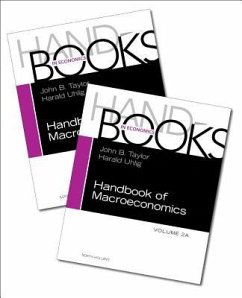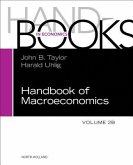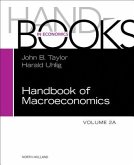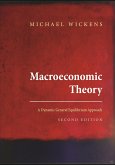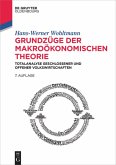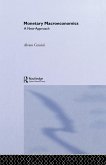Handbook of Macroeconomics Volumes 2A and 2B surveys major advances in macroeconomic scholarship since the publication of Volume 1 (1999), carefully distinguishing between empirical, theoretical, methodological, and policy issues, including fiscal, monetary, and regulatory policies to deal with crises, unemployment, and economic growth. As this volume shows, macroeconomics has undergone a profound change since the publication of the last volume, due in no small part to the questions thrust into the spotlight by the worldwide financial crisis of 2008. With contributions from the world's leading macroeconomists, its reevaluation of macroeconomic scholarship and assessment of its future constitute an investment worth making.
"Macro is moving fast, partly because of technological progress and new data, partly because of the intellectual shocks triggered by the crisis. This handbook, like its predecessors, gives us the current state of the arts." --Olivier Blanchard, Massachusetts Institute of Technology
"The new volumes in the Handbook of Macroeconomics illustrates both the richness and the enormous breadth of modern research in macroeconomics. The chapters offer in depth surveys of critical areas, new empirical results to guide future researchers, analytical and computational tools for addressing macroeconomic issues, and examples of how these tools can be applied to advance our understanding of aggregate economic behavior. These volumes constitute an important resource for all macroeconomists, one that is certain to be widely used." --Carl E. Walsh, University of California, Santa Cruz
"This Handbook is the ideal starting point to get up to speed quickly on any major topic in Macroeconomics: What we have learned and what are the most pressing open questions." --Pete Klenow, Stanford University
"This remarkable collection belies uninformed critics who assert that modern macroeconomics was wrong footed by the 2007-2009 financial crisis. Articles in this book prove how, both before and after that crisis, working macroeconomists had rolled up their sleeves to study how financial frictions, incentive problems, incomplete markets, interactions among monetary, fiscal, regulatory, and bailout policies, and a host of other issues affect prices and quantities and good economic policies. This is an especially timely book." --Thomas Sargent, New York University
"The new volumes in the Handbook of Macroeconomics illustrates both the richness and the enormous breadth of modern research in macroeconomics. The chapters offer in depth surveys of critical areas, new empirical results to guide future researchers, analytical and computational tools for addressing macroeconomic issues, and examples of how these tools can be applied to advance our understanding of aggregate economic behavior. These volumes constitute an important resource for all macroeconomists, one that is certain to be widely used." --Carl E. Walsh, University of California, Santa Cruz
"This Handbook is the ideal starting point to get up to speed quickly on any major topic in Macroeconomics: What we have learned and what are the most pressing open questions." --Pete Klenow, Stanford University
"This remarkable collection belies uninformed critics who assert that modern macroeconomics was wrong footed by the 2007-2009 financial crisis. Articles in this book prove how, both before and after that crisis, working macroeconomists had rolled up their sleeves to study how financial frictions, incentive problems, incomplete markets, interactions among monetary, fiscal, regulatory, and bailout policies, and a host of other issues affect prices and quantities and good economic policies. This is an especially timely book." --Thomas Sargent, New York University

